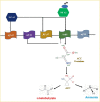Bacterial ACC deaminase: Insights into enzymology, biochemistry, genetics, and potential role in amelioration of environmental stress in crop plants
- PMID: 37180266
- PMCID: PMC10174264
- DOI: 10.3389/fmicb.2023.1132770
Bacterial ACC deaminase: Insights into enzymology, biochemistry, genetics, and potential role in amelioration of environmental stress in crop plants
Abstract
Growth and productivity of crop plants worldwide are often adversely affected by anthropogenic and natural stresses. Both biotic and abiotic stresses may impact future food security and sustainability; global climate change will only exacerbate the threat. Nearly all stresses induce ethylene production in plants, which is detrimental to their growth and survival when present at higher concentrations. Consequently, management of ethylene production in plants is becoming an attractive option for countering the stress hormone and its effect on crop yield and productivity. In plants, ACC (1-aminocyclopropane-1-carboxylate) serves as a precursor for ethylene production. Soil microorganisms and root-associated plant growth promoting rhizobacteria (PGPR) that possess ACC deaminase activity regulate growth and development of plants under harsh environmental conditions by limiting ethylene levels in plants; this enzyme is, therefore, often designated as a "stress modulator." TheACC deaminase enzyme, encoded by the AcdS gene, is tightly controlled and regulated depending upon environmental conditions. Gene regulatory components of AcdS are made up of the LRP protein-coding regulatory gene and other regulatory components that are activated via distinct mechanisms under aerobic and anaerobic conditions. ACC deaminase-positive PGPR strains can intensively promote growth and development of crops being cultivated under abiotic stresses including salt stress, water deficit, waterlogging, temperature extremes, and presence of heavy metals, pesticides and other organic contaminants. Strategies for combating environmental stresses in plants, and improving growth by introducing the acdS gene into crop plants via bacteria, have been investigated. In the recent past, some rapid methods and cutting-edge technologies based on molecular biotechnology and omics approaches involving proteomics, transcriptomics, metagenomics, and next generation sequencing (NGS) have been proposed to reveal the variety and potential of ACC deaminase-producing PGPR that thrive under external stresses. Multiple stress-tolerant ACC deaminase-producing PGPR strains have demonstrated great promise in providing plant resistance/tolerance to various stressors and, therefore, it could be advantageous over other soil/plant microbiome that can flourish under stressed environments.
Keywords: ACC deaminase; PGPR; environnemental stress; ethylene; mode of action; plants.
Copyright © 2023 Shahid, Singh, Khan, Singh, Kumar, Singh, Kumar and Singh.
Conflict of interest statement
The authors declare that the research was conducted in the absence of any commercial or financial relationships that could be construed as a potential conflict of interest. The reviewer RK declared a shared affiliation with the authors MS, US, and HS to the handling editor at the time of review.
Figures




References
-
- Ahmad E., Khan M. S., Zaidi A. (2013). ACC deaminase producing pseudomonas putida strain PSE3 and rhizobium leguminosarum strain RP2 in synergism improves growth, nodulation and yield of pea grown in alluvial soils. Symbiosis (Philadelphia, PA) 61, 93–104. doi: 10.1007/s13199-013-0259-6 - DOI
-
- Ahmed B., Zaidi A., Khan M. S., Rizvi A., Saif S., Shahid M. (2017). “Perspectives of plant growth promoting rhizobacteria in growth enhancement and sustainable production of tomato” in Microbial strategies for vegetable production, eds. Zaidi, A., Khan, M. (Cham: Springer; ), 125–149.
-
- Ajuzieogu C. A., Ibiene A. A., Stanley H. O. (2015). Laboratory study on influence of plant growth promoting rhizobacteria (PGPR) on growth response and tolerance of Zea mays to petroleum hydrocarbon. Afr. J. Biotechnol. 14, 2949–2956. doi: 10.5897/AJB2015.14549 - DOI
Publication types
LinkOut - more resources
Full Text Sources
Molecular Biology Databases
Miscellaneous

